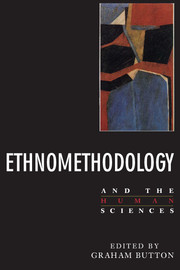Book contents
- Frontmatter
- Contents
- Contributors
- Preface
- 1 Introduction: ethnomethodology and the foundational respecification of the human sciences
- 2 Respecification: evidence for locally produced, naturally accountable phenomena of order, logic, reason, meaning, method, etc. in and as of the essential haecceity of immortal ordinary society (I) – an announcement of studies
- 3 Logic: ethnomethodology and the logic of language
- 4 Epistemology: professional scepticism
- 5 Method: measurement – ordinary and scientific measurement as ethnomethodological phenomena
- 6 Method: evidence and inference – evidence and inference for ethnomethodology
- 7 The social actor: social action in real time
- 8 Cognition: cognition in an ethnomethodological mode
- 9 Language and culture: the linguistic analysis of culture
- 10 Values and moral judgement: communicative praxis as moral order
- References
- Index
4 - Epistemology: professional scepticism
Published online by Cambridge University Press: 05 June 2012
- Frontmatter
- Contents
- Contributors
- Preface
- 1 Introduction: ethnomethodology and the foundational respecification of the human sciences
- 2 Respecification: evidence for locally produced, naturally accountable phenomena of order, logic, reason, meaning, method, etc. in and as of the essential haecceity of immortal ordinary society (I) – an announcement of studies
- 3 Logic: ethnomethodology and the logic of language
- 4 Epistemology: professional scepticism
- 5 Method: measurement – ordinary and scientific measurement as ethnomethodological phenomena
- 6 Method: evidence and inference – evidence and inference for ethnomethodology
- 7 The social actor: social action in real time
- 8 Cognition: cognition in an ethnomethodological mode
- 9 Language and culture: the linguistic analysis of culture
- 10 Values and moral judgement: communicative praxis as moral order
- References
- Index
Summary
Introduction
In our view, the epistemological arguments over ‘objectivity and relativism’, the relationship between ‘commonsense and pure reason’, the issue of ‘a paramount and multiple realities’, the relationship between ‘objects and appearances’ and other related epistemological issues in sociology and the human sciences seldom get beyond first base, not least because it is hard to get the lines of division identified well enough for there to be agreement on what are indeed the points of difference. Here we attempt a first base treatment of these issues by reverting to consideration of them in terms of Schutz's argument, and other basic phenomenological considerations. We do this because reasoned presentation of the issues in simple terms may help with the uphill struggle that, as Margolis (1986) observes, confronts anything that looks like a ‘relativist’ position – and we add, any which might be construed as ‘subjective’ in approach – because it will be typically presented by the opposition as blatantly stupid. Our objective is to display how Schutz, then Garfinkel and ethnomethodology, transforms the formulation of epistemological criteria into the topic of describing the properties of social organisation.
Examining social reality
It is a serious mistake to set philosophical scepticism on all fours and head to head with common sense understandings as though one straightforwardly and directly challenged the other. It is a usual characteristic of that scepticism that it seeks to operate at another level than the one on which our ordinary claims to knowledge get made.
- Type
- Chapter
- Information
- Ethnomethodology and the Human Sciences , pp. 51 - 76Publisher: Cambridge University PressPrint publication year: 1991
- 23
- Cited by



